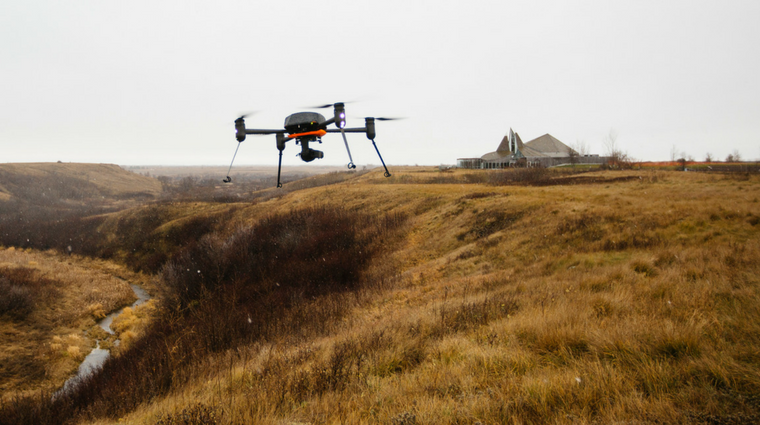One example: unmanned aerial vehicles (UAVs), commonly called drones. It is absolutely amazing what these devices can do and how organizations are using them in innovative ways.
A leader in UAV technology and application is a Saskatchewan company, Draganfly Innovations Inc.
Draganfly recently won the Product Award at the Saskatoon Regional Economic Development Authority’s (SREDA) Science, Technology, Innovation and Collaboration (STIC) Awards. This prestigious award recognizes an innovative product or service that has significantly impacted its sector.
Saskatchewan Polytechnic is proud of the role it played in helping Draganfly achieve this recognition.
In a partnership with Sask Polytech, Draganfly applied for, and received a grant through the Natural Sciences and Engineering Research Council (NSERC) to pursue research proving the efficacy and innovation of conservation officers using drones to record and analyse crime scenes.
Using drones and automated data collection, researchers and law enforcement are able to recreate, and essentially, preserve crime scenes so they can be measured and observed without disturbing the area.
This partnership is an excellent example of how a company can benefit from a polytechnic’s expertise in applied research—an area that is a differentiator for Saskatchewan Polytechnic.
Unlike research that takes place at many universities, applied research assesses a need, proves a concept, and tests new products to refine them for market. By partnering with Sask Polytech, companies are able to get access to equipment, sources of funding and, most importantly, the expertise of our talented instructors and students.
As innovation takes on greater importance, it is little wonder that the institution’s focus on applied research is growing.
In 2017-18, Sask Polytech serviced 168 companies, and worked on 136 applied research projects, up from 88 during the previous academic year.
In fact, Sask Polytech is now ranked No. 6 on the 2018 list of Canada’s Top 50 Research Colleges, in terms of research income growth, according to Research InfoSource Inc. Research InfoSource is a Toronto-based research, consulting and publishing firm that specializes in policy, research, business intelligence and analysis on science, technology, innovation, and the Canadian R&D ecosystem.
Another company that has benefitted from Sask Polytech’s applied research expertise is Craven SPORT Services of Saskatoon. The company specializes in holistic treatment for a range of health and injury concerns, from nutrition, to mental fitness, to retraining the body to heal and respond to new challenges.
Co-owner and President Bruce Craven had an idea to help athletes he trains: Build a virtual coach, capable of observing and analysing motion, and providing instant feedback on what the athlete is doing right and what they need to refine and improve. He credits Sask Polytech with being the driving force behind efforts to turn his idea into reality, helping to map out the project, create a framework, and apply for a grant from NSERC.
Craven envisions the solution will be portable and used on a tablet, computer or television monitor. The project is currently in the pilot stage
Says Craven, “The difference with Sask Polytech is they’re solving the problem, not just researching the problem.”
At Saskatchewan Polytechnic, we currently have 89 applied research projects underway. We look forward to sharing more success stories of how Sask Polytech is fuelling innovation through applied research.


